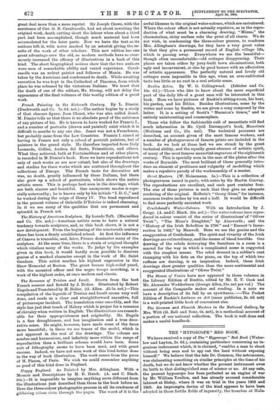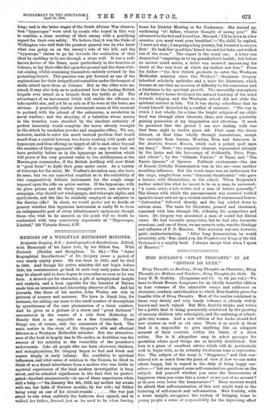king ; and in the latter stages of the South
African War observa- tion "hyposcopes" were used by scouts who hoped in this way to combine a close scrutiny of their enemy with a gratifying regard for their own safety. We believe that it was the Duke of Wellington who said that the greatest general was he who knew what was going on on the enemy's side of the hill, and the "hyposoope" claims to go far towards the realisation of that ideal by enabling us to see through a stone wall. It was a well- known device of the Boers, more particularly in the trenches at Coleus°, inlay their rifles flat upon the ground and fire them with- out aiming, whilst remaining themselves entirely covered by the protecting trench. This practice was put forward as one of the explanations for their insignificant casualties under the tempest of shells rained upon them at Colenso. But as the rifles were =- aimed, it may also help us to understand how the leading British brigade ever issued as a brigade from the battle at all. The advantages of an instrument which will enable the rifleman to take careful aim, and yet he as safe as if he were at the butts, are obvious. A practically similar instrument seems at this moment to portend, with the advent of the submarine, a revolution in naval warfare ; and the shooting of a battalion whose nerves in the trenches were steadied by the absolute certainty of perfect immunity would complete the havoc already wrought in the attack by smokeless powder and magazine rifles 4 We are, however, unable to solve the novel tactical problem that would result from a contest between two forces working with spade and hypoacope, andthus offering no target at all to each other beyond the muscles of their opponents' rifles! It is easy to see that we have probably before us in the hyposcope en invention which will prove of the very greatest value to the artilleryman or the Maxim-gun commander, if the British Artillery will ever think it "good form" to fight their guns -under cover. .As a variety of telescope for the scout, Mr. Youlten's invention may also have its noes; but we are somewhat sceptical as to the suitability of this comparatively delicate instrument for the rough usage imposed upon the rifle on active service. If the hyposoope, with its glass prisms and its finely wrought screws, can endure a campaign, why should not wind-gauges, and telescopic sights, and spirit-levels, and the like be similarly employed as adjuncts to the Service rifle ? In short, we would prefer not to decide at present whether this ingenious instrument is really fit to form an indispensable part of every infantryman's equipment, though those who wish to be assured on the point will no doubt be confronted with very convincing arguments at " Byposcopes, Limited," 155 Victoria Street, S.W.
MEMOIRS OF A WESLEYAN METHODIST MINISTER. home for District Meeting or for Conference. She started up, exclaiming ' 0 ! father, whoever thought of seeing you?' He advanced to the bed and kiseed her. She said • I'll be down in a few minutes, you must want your breakfast.'—' No, child,' he replied, 'I must not stay; I amgoing along journey,but 'wanted to see you first.' He bade Ger' good-bye,' kissed her and her babe, and walked out of the room." The sequel is the usual one. A letter was despatched " enquiring as to my grandfather's health ; but before an answer could arrive, a letter was received announcing his death at the very hour at which my mother saw him." From his father—"the first Oxford graduate to enter the:Wesleyan Methodist ministry since the. Wesleys "—Benjamin Gregory inherited scholarly aptitudes and a taste for literature, whicls became at one time an occasion of difficulty to his conscience and a hindrance to his spiritual growth. The unworldly atmosphere of his father's house developed the natural tendency of his mind towards religion, and the liVesleyeas school did not stifle the spiritual instinct in him. Yet it was during schooltime that he found himself disturbed by a conflict of interests. "The way in which I lost wholly, for a time, the bright religion of my child- hood was through other interests, ideas, and images gradually gaining possession of my imagination and affection.. It must be premised that the period I am now dealing with was that from eight to twelve years old. First came the classic interest, at that time wholly through translations, except the excerpts from Lucian, Moschus, Bion and Anacreon in the Analecta Graeae Minoru, which east a potent spell upon nay fancy." Next, "the romantic element, represented strongly by the lyrics and the love-songs of Goldsmith, Prior, Pope, and others"; by the "Orlando Furious" of lasso, and "The Faerie Queene" of Spenser. Political excitements—the stir of Roman Catholic Emancipation was in the air—were another troubling influence. But the worst snare was an enthusiasm for the stage, caught from some "itinerant elocutionists" who gave a lecture, with illustrations, to the school. When Benjamin's mother asked him what he meant to be as a man, he answered "A comic actor, a tale writer, and a man of letters generally." The silence with which the announcement was received worked upon his heart and set up a violent reaction of remorse and horror. "Conversion" followed shortly, and the boy settled down to serious aims. The taste for literature, pruned and chastened, remained with him through life, widening his sympathies and views. Dr. Gregory was accounted a man of sound but liberal views. He had versatile sympathies, but he had also favourite aversions ; and one of these, we are sorry to note, was the theology and influence of F. D. Maurice. This aversion was not, however, quite undiscriminating. "After long denunciation, be would invariably add, But, mind you, his Prophets mut Kings of the Old Testament is a mighty book. I always except that when I speak of Maurice.'" MISS SOULSBY'S "STRAY THOUGHTS" IN AN "EDITION DE LUKE."























































 Previous page
Previous page